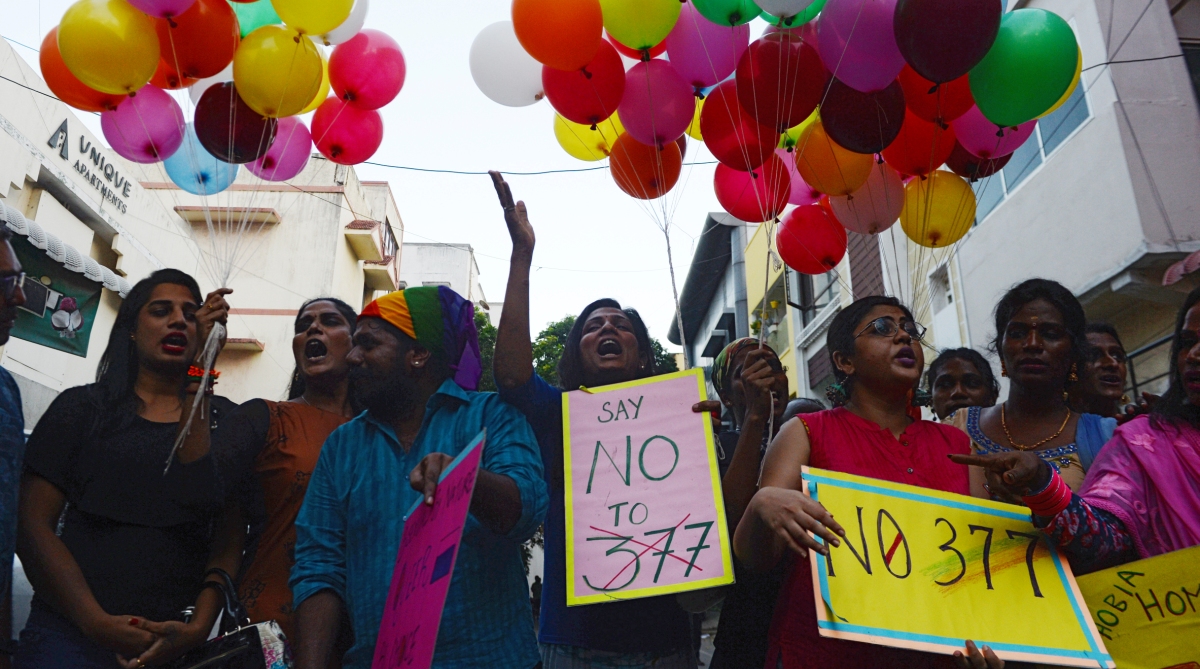EC defends integrity of EVMs in SC, asserts it can’t be manipulated
The Election Commission of India (ECI) defended the integrity of the electronic voting system, asserting that it was not prone to any external interference or manipulations.
Make way for progressive realization of social and economic rights and to begin a dialogue for ensuring individual rights reports, have to bid adieu to perception stereotypes: Dipak Misra

Members of the LGBT community take part in a "Indian Coming out Day" celebration to mark the anniversary of Delhi High Court's verdict amending section 377 of Indian Penal Code (IPC), in Chennai on July 2, 2018. (Photo: AFP PHOTO / ARUN SANKAR)
In a landmark verdict, the Supreme Court on Thursday decriminalized the homosexuality as it reversed its own 2013 decision restoring Section 377, a controversial British-era ban on consensual gay sex.
The five-judge constitution bench of Chief Justice Dipak Misra, Justice Rohinton Fali Nariman, Justice AM Khanwilkar, Justice DY Chandrachud and Justice Indu Malhotra had reserved the verdict on 17 July on the conclusion of arguments.
Pronouncing the verdict, Chief Justice Misra said, “Privacy of human beings constitutes the cardinal rule of our constitution. Make way for progressive realization of social and economic rights and to begin a dialogue for ensuring individual rights reports, have to bid adieu to perception stereotypes.”
Advertisement
“Sustenance of identity is the pyramid of life,” he added.
Also Read | What is Section 377? Everything you want to know
The verdict assumes significance as in the earlier round of litigation in 2013 the Supreme Court had reversed the Delhi High Court ruling decriminalising homosexuality or same sex relationship,
On July 17, the apex court had concluded hearing the arguments on the contentious issue after detailed hearing, which had commenced on July 10.
The tone and tenor of the hearing of the matter on 17 July saw the court telling that it was duty bound to strike down a law that is in conflict with the fundamental rights and not to leave it to majoritarian government to address it.
“The moment we are convinced that a law is violative of the fundamental rights we will strike it down and not relegate it to legislature,” the court had said.
Section 377 refers to ‘unnatural offences’ and says whoever voluntarily has carnal intercourse against the order of nature with any man, woman or animal, shall be punished with imprisonment for life, or with imprisonment of either description for a term which may extend to 10 years, and shall also be liable to pay a fine.
Read More | ‘Article 377 is a violation of our Fundamental Rights’
The apex court heard the writ petitions filed by dancer Navtej Jauhar, journalist Sunil Mehra, chef Ritu Dalmia, hoteliers Aman Nath, Keshav Suri and business executive Ayesha Kapur and 20 former and current students of the IITs.
They had sought decriminalisation of consensual sex between two consenting adults of the same sex by declaring section 377 of IPC as illegal and unconstitutional.
Advertisement